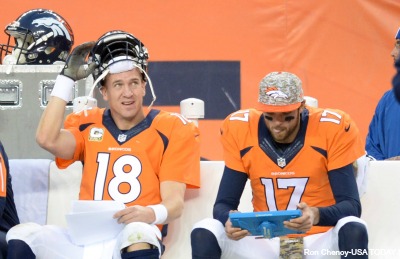Two of the greatest players of their respective sports and generations are breaking down at the same time. In Peyton Manning's case, the decline has been more gradual and possibly aided by playcalling that minimized his weaknesses.
Kobe Bryant's arc has been almost the opposite: Though we've anticipated his decline through two major injuries that limited him to 41 games the previous two seasons, few projected such a cataclysmic self-destruction. Playing on a bad team with a below-average coach and an aggressive playing style outpacing his physical abilities, Bryant is a devastating car crash in super-slow motion. The tires are off, the windshield is shattered, the vehicle is airborne and the hood is spitting fire.
It's horrifying to watch, and yet, this has always seemed like the inevitable end for Kobe, who eats machismo for breakfast and flosses with willpower at night. Athletes tend to lose that inevitable fight against aging. The smart ones adapt, changing their playing style to prolong their careers and capitalize on the things they can still do well.
But Kobe has pushed forward with a stubbornness that promised to sabotage the tail end of his career. It's not the bad teammates or head coach that are causing Kobe's freefall. What made Kobe great is what's now bringing his career to an end.
Statistically, things couldn't be much worse. Before last season, Bryant had never shot less than 42.5 percent from the floor in a season. In 11 games this year, he's shooting 31.1 percent. Never a great three-point shooter, Bryant is averaging a career-high seven attempts per game this year, and making just 19.5 percent of them.
In points, rebounds, assists, steals, blocks -- almost every major statistic -- Bryant has declined from last season. There's only one stat that has held the line: Free-throw percentage, which at 83.3 percent is almost exactly in-line with his career figure.
That makes a clear suggestion: Kobe's knees are gone. Anyone with two eyes and a television could tell you as much, but it's affirming nonetheless: For a shoot-first guy like Kobe, knee problems are the Grim Reaper knocking. Check out this collection of ugly misses from Tuesday night's game against Golden State:
Kobe is playing the way he always has, only now, his body is failing him. That's sad to see -- especially because Bryant insists on maintaining that approach to the game. He hasn't been shy about criticizing the players around him, but when Bryant is playing that poorly as the centerpiece of the team's offense, there's no other outcome but losing. He said after the loss to the Warriors that it wouldn't have mattered if he'd scored 80 points -- the team still would have lost. Maybe so, but that distracts from the team's primary problem: Kobe pretending that he's still Kobe.
Manning hasn't been such a liability to his team. His play hasn't been great this season, but he did enough to lead Denver to a 5-0 start. Even as he sits out to nurse a plantar fascia injury, his team is almost a lock to win its division and host a first-round playoff game.
We've seen signs that Manning is breaking down. Fans have been diagnosing it since he returned from his series of neck surgeries in 2012, and like a broken clock, they're finally right. Before the season, it was revealed that Manning no longer had feeling in the tips of his fingers, and hadn't since 2011.
His throwing strength had seemed to decline, but that didn't matter as much because, in 2012 and 2013, he posted near-career highs in completion percentage. In his first three seasons as a Bronco, he threw 131 touchdowns.
2015 has been much different. Manning's completion percentage dipped below 60 for the first time since his rookie year. His yards-per-completion also dropped, and he's thrown just nine touchdowns against 17 interceptions.

Injuries may be playing their part -- he threw four interceptions and was benched in his last appearance against Kansas City, in which he aggravated his foot injury. Even so, it's hard to deny that Peyton's career seems to be winding down. Yet we can't say so with the same confidence we've written off Kobe, and for a few reasons.
Some of them aren't fair comparisons to Bryant: Manning plays on a much better team, anchored by a great defense, and so the demands on him aren't as great as other quarterbacks. Meanwhile, Manning hasn't missed one-and-a-half seasons in the past two years to major injuries. But here's where Manning has an advantage over Bryant: He's more aware of his limits, and presumably more willing to change his playing style.
If Manning's arm strength has declined, there's no doubt he'll respond by avoiding deep throws, and focusing on shorter, snappier passes. Manning's decisions in the pocket can protect him from his shortcomings being so exposed. The same decisions are available to Kobe, but he's shown no willingness to make them.
As a result, you've got two versions of a similar ending to great sports careers. With Manning, you cling to the hope that he can reinvent himself, hit the right passes and put together another good game.
With Kobe, you grit your teeth and brace for the inevitable.

























